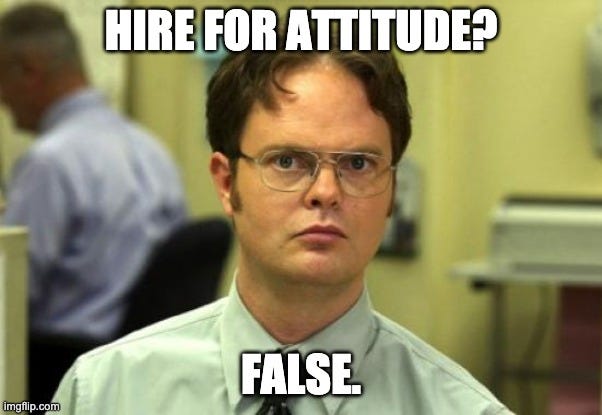Don't hire for attitude.
Or?
Hello, 700+ subscribers! Join the like-minded people who are interested in leadership, HR, and what’s next in the HR space here;
🎉 Happy Thursday, folks,
If you want to listen to this article, it’s available on Spotify and Apple Podcast.
For several years, I worked as a ski teacher. It was supposed to be for just one season; then one season became two seasons, then three seasons, and such. It was fun to meet new guests, teach them how to get down a slope gracefully, and see the progress they all made! To teach someone to ski, you need to have many different competencies, but there's one virtue above all when you work as a ski teacher - patience.
So little Lisa doesn't want to ski and now lies screaming for her parents in the snow?
Patience.
68-year old Tom wants to learn skiing but can't, after three hours of private lessons, really understand how not to cross the skis?
Patience.
Jeff freaks out two meters before the chair lift?
Patience.
So having practiced patience for a substantial amount of time, I deem myself a person with at least some of it.
But there's one thing I don't have any patience for - crappy LinkedIn-post based on general statements. And there's one in particular that I have no patience for at all, and that's the platitude:
"Hire for attitude - train for skills."
It still gets dropped on LinkedIn from time to time.
My head explodes every time I see it.
Why? Because its underlying premise is that you can hedge poor skills with a great attitude and learn everything on the job if you have the right attitude.
This summer, while in Helsingborg, I had a kidney stone and ended up at the hospital. I'm very thankful that the doctor that examined me had the right skills and a doctor's exam vs. if they had hired some kid out of the street that lacked the education but had the right attitude.
And yes, that's the extreme case, but I think you see the point I'm trying to make.
Skills still matter in most roles.
On the other hand, how you acquire the skills might differ. Perhaps not for roles such as doctors, lawyers, and other professions that require you to pass bars and exams but for different positions, you might learn these jobs in various ways. And I'm confident that we will need to be life-long learners and that we will have several different jobs that will require other skills throughout our lives.
To do these jobs, you still need the skills.
Don't get me wrong here; attitude matters. Can it solely replace skills? Not in my opinion.
But then again, I might need more patience.




